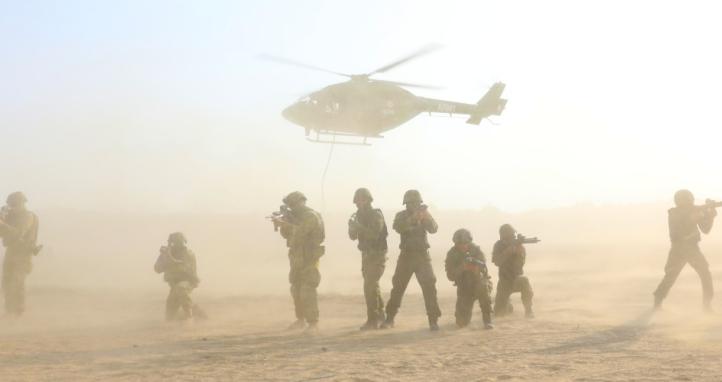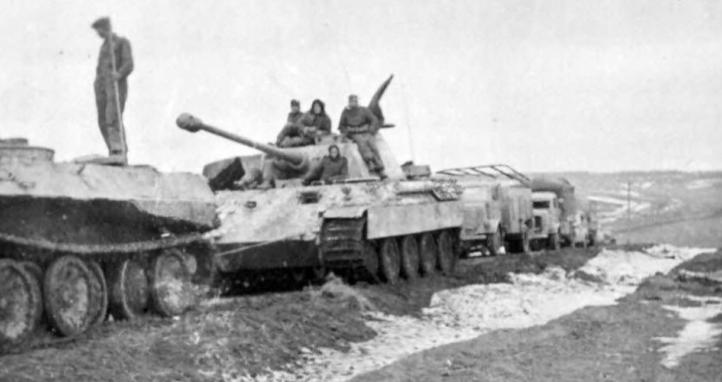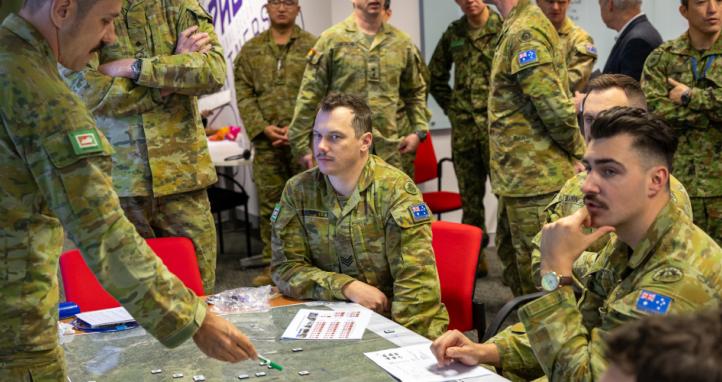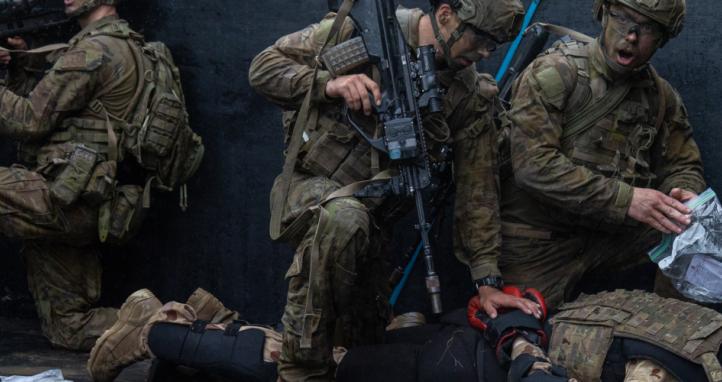Field hygiene: Keeping you ready and combat effective
In military operations, effective field hygiene is not a luxury, it’s a necessity. Maintaining proper hygiene in the challenging environments of the battlefield directly influences the health, morale, and combat effectiveness of troops. We’ll discuss a few key points and tips you should keep in mind to stay ready in the field and let you focus on your job.
Minimising disease and infection
In austere and dynamic operational settings, soldiers face an array of biological hazards. From infectious diseases like dysentery and leptospirosis to skin infections caused by prolonged exposure to dirt and moisture, field hygiene practices are essential in reducing the likelihood of outbreaks. These diseases not only compromise individual health but can also degrade unit cohesion and overall operational capacity.
Enhancing combat readiness
An outbreak of illness or infection can weaken a unit’s fighting strength almost immediately. Field hygiene, therefore, underpins combat effectiveness by ensuring that soldiers remain physically prepared and mentally focused. Even minor lapses in hygiene can lead to attrition in an operational environment, making rigorous hygiene important to you and your unit.
Preserving resources
Maintaining hygiene in the field also plays a strategic role in preserving supplies such as food and water. Contamination risks are minimised when waste is properly managed and when potable water is treated, thereby sustaining the longevity of field operations under demanding conditions.
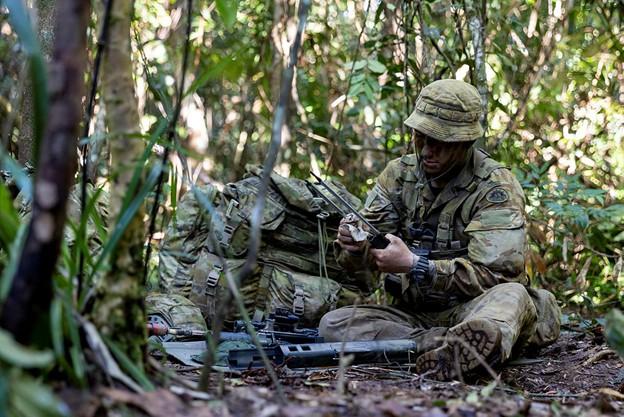
Australian Army Trooper Mark Savage from the 2/14th Light Horse Regiment cleans his EF88 Austeyr Rifle during morning routine at the Combat Training Centre – Jungle Training Wing, Tully, Queensland.
Daily Field Hygiene Guidelines
Your hygiene in the field is up to you. Develop a routine and stay accountable to yourself. You owe it to yourself and your mates to be clean and healthy as part of your overall mission readiness.
While your hygiene is your own responsibility, some soldiers can develop bad habits of just ‘toughing it out” and simply might not have the knowledge of the risks involved with poor hygiene. Commanders should make it a point to ensure their soldiers get the chance to learn core hygiene skills from more experienced NCOs.
Sleep and rest
- Aim for 7–8 hours of sleep every day in a warm, dry, ventilated area, although it’s likely you won’t get this all the time in the field environment. Consider sleep a weapon, and take as much as you can get, when you can get it – you never know when you’ll get to sleep next out field!
Personal cleanliness
- Clean key body areas daily: armpits, waist, feet, face, hair, teeth, and crotch, even if a full shower isn’t possible. Use unscented wet wipes or water, soap and a cloth. Using them on high-contact areas such as the face, neck, armpits, and groin can help reduce body odour and remove surface-level bacteria.
- Prickly heat is a real risk, as sweat and bacteria accumulate, often leading to skin irritation and heat rash. Prickly heat can quickly become debilitating, affecting your focus, sleep, and overall performance in the field. Getting some Isocol or EZ Scrub 4% will help, as its antimicrobial properties helps cleanse the skin, preventing the onset of painful rashes. When used as part of a routine it can significantly improve comfort and maintain combat effectiveness during sustained operations.
- Urinary Tract Infection can cause significant discomfort and illness if left untreated. Due to anatomical differences, female personnel are at a higher risk of developing urinary tract infections, particularly in dehydrated or unhygienic conditions. You should regularly urinate and maintain adequate hydration to prevent this.
- Consider cutting your hair short before you leave for longer exercise periods to make it easier to maintain your health. Dry shampoo can also help, as the occasional use of small amounts of dry shampoo or cleansing powders can refresh hair by absorbing oils and dirt without requiring water.
- Dental hygiene is crucial. Use travel-sized toothpaste and a cut-down or kids-sized toothbrush to brush your teeth at least twice a day. This routine helps prevent dental issues that could develop into larger health problems. Using sugar-free gum in the ration packs after meals/snacks is an excellent way to supplement twice-daily toothbrushing. A small bottle of mouth wash is also very useful to compliment brushing teeth. It’s really embarrassing to be evacuated for a rotten tooth.
- For men, shaving is both a necessity and a requirement. It makes you clean your face and prepares your skin for the reapplication of camouflage cream for the day. Use an unscented moisturiser or gel with anti-irritant properties to protect your face and avoid interfering with the camouflage cream. Shaving also reduces the risk of tick bites, as without hair, it is more challenging for ticks to grip onto the skin, and it is easier to spot any attached ticks. Shaving can also make detected ticks easier to remove.
- Personnel who menstruate should be advised to pack sufficient menstrual products to last the full duration of the exercise or deployment. The use of reusable items like menstrual cups or cloth pads may be impractical in field environments due to challenges with washing and hygienic storage. Commanders will ensure appropriate, discreet, and hygienic disposal methods for used products are available and communicated.
- Keep a personal cleaning kit stocked with essential items such as a small brush, wipes, disinfectant, and a microfiber cloth. Regularly check your kit to ensure supplies are replenished so you're always prepared for unexpected messes or contamination.
- Keep your personal hygiene items organised in a waterproof pouch. This helps protect your supplies from dust, moisture, or contamination – ensuring that your tools for cleanliness are always ready when you need them.
- Maintain regular bowel movements and overcome any shyness where you go (like a latrine pit). There often won’t be any other options.
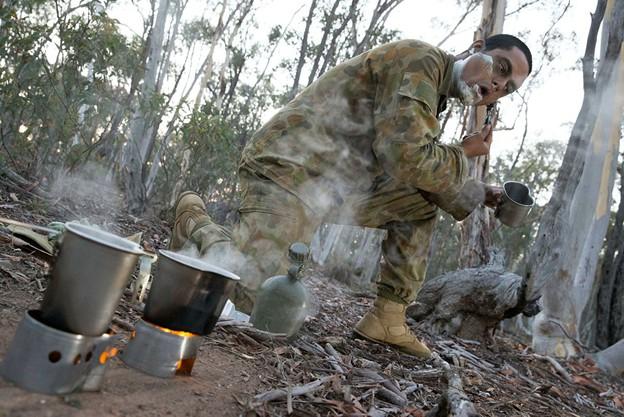
Australian Army officer trainee Staff Cadet Gaurav Saini from Royal Military College at Duntroon conducts morning routine during the field phase of his initial cadet training at Majura training area, Canberra, on 8 March 2016.
Food and digestion
- Eat a varied, balanced diet. Consume all parts of field rations. They are designed to keep you in good health until fresh food can be provided, but only if you eat at least a little of each part of the ration. If you are given hot food, such as a hot box, eat it immediately and never save it. As early as two hours after it is cooked, the chance of illness from spoiled food increases quickly. Personal food items (jack rations) may cause health issues, especially if you store them after they have been opened.
- Fruit is a different case. You can easily store it and eat it later when convenient, and it assists bowel movements with the fibre content, not to mention they are packed full of essential vitamins to assist immune health.
- Remember to always wash hands with soap and water, if not available use alcohol-based hand sanitiser prior to any food handling or eating.
- Ensure that all water used for consumption is safe. In emergencies you may need to win water from insecure sources, if this is the case you should employ purification methods such as chemical tablets, portable filters, or boiling to eliminate harmful microorganisms. This will ward off gastrointestinal illnesses associated with contaminated water.
- Use water conservatively and wisely. In the field, water might be scarce and must be purified before use. If purified water is scarce, use it for essential cleaning tasks such as washing your face, hands, and critical parts of your gear, and when shaving. Prioritise water usage for consumption (drinking and cooking).
- Clean food and drink containers thoroughly, including water bottles, cooking vessels and your Camelbak. After each meal, wash containers and utensils (like the ‘battlespoon’) with soap and/or boiling water if possible. This prevents the build-up of bacteria that could lead to gastrointestinal issues.
Clothing and footwear
- Wear clean, dry socks (preferably wool) of the correct size. Underwear must be clean and changed as often as tempo and equipment allows, but ideally, it should be daily.
- Regularly wash uniforms to prevent the build-up of dirt, bacteria, and other contaminants. At the end of each day, inspect your uniform and boots for wear and damage. A quick brush-off or wipe-down can prevent long-term wear and reduce bacterial growth. These practices not only minimise skin infections but also prolongs the life of gear, ensuring that both personnel and equipment remain mission-ready.
- Your boots see the roughest conditions. After operations or training, remove excess mud and debris. Allow your boots to dry properly and then apply waterproofing or conditioning products if needed. Clean soles can also enhance traction and reduce slippage on uneven terrain.
- Items like helmets, load-bearing vests, and communication devices can accumulate dirt and sweat. Use disinfecting wipes or a damp cloth with a mild cleaning agent to routinely wipe down these items.
- While cleaning yourself, keep personal items like glasses, watches, and other wearable equipment wiped down. Dirt and sweat can transfer from your body to these items, so maintaining them ensures you’re keeping both your skin and personal gear clean.
- It is always a good idea to have a small garbage bag in your pack to easily stow away dirty wipes until an opportunity arises to dispose of them properly.
- Organise your personal area, backpack, or tent space so that clean items remain separate from those that are in use or have been exposed to dirt. Clear designation of “clean” vs “dirty” zones helps maintain overall hygiene.
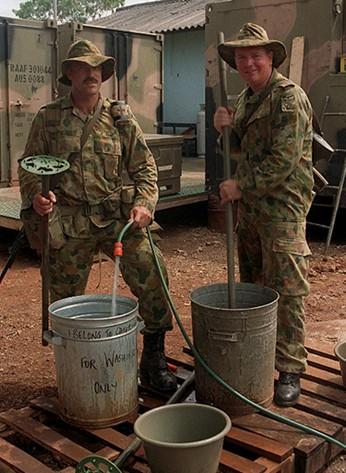
Pic by SGT Guthrie. V9919228. Soldiers about to do their washing
Wound care
- Cleaning, appropriate dressing, and routine monitoring of even minor injuries can prevent infections and ensure that small injuries do not escalate into larger health issues.
- Injuries or scrapes, even minor ones, can rapidly become a source of infection if not kept clean. Clean wounds immediately with available antiseptics or potable water, cover them with appropriate dressings, and monitor for signs of infection. Keeping your skin clean is just as important as maintaining equipment cleanliness.
- Keep a personal medical kit stocked with essential items such as an antiseptic, tweezers, band-aids, bandages, basic pain medication, foot powder, Isocol, and strapping tape, in addition to your individual first aid kit. If you have a pre-existing or chronic injury prior to deploying, you should know what you require daily and bring enough to last. Regularly check your kit to ensure supplies are replenished, so you're always prepared for minor injuries or illnesses and can fix them on the spot.
- Waterproof dressings are important especially if you are in a wet or tropical environment, or you might have to conduct water crossings.
Preventive measures:
- Follow all instructions for protection from insect-borne and communicable diseases. Your chain of command is giving them to you for a reason. Always wear uniforms with sleeves rolled down to prevent bug bites, and for sun protection.
- When using field latrines or communal washing areas, try to leave the space as clean as possible. Dispose of sanitary items appropriately, and if you’ve used any personal cleaning cloths or towels, wash them as soon as you can.
- Always carry a small bottle of alcohol-based hand sanitiser. Use it before meals, after using latrines, and whenever soap and water aren’t immediately available. This simple step helps prevent the spread of germs.
| NOTE: Skin Protection, Shaving and Infection: It is strongly advised to avoid shaving any part of your body other than facial hair in the days leading up to deploying out field due to increased risk in infection. Shaving can cause micro-abrasions and small cuts in the skin, which become ideal entry points for bacteria, especially in austere environment where dust, sweat, and limited hygiene facilities can compromise skin integrity. Even minor skin irritations can escalate into serious infections that could affect your health and operational effectiveness. Prevention is always better than a cure. |
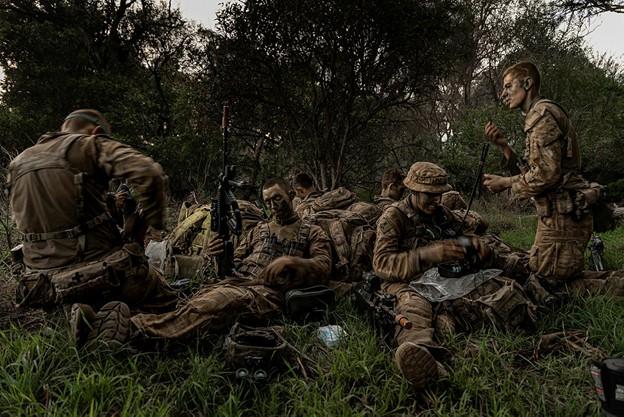
Staff Cadets from the Royal Military College – Duntroon conducting morning routine during Exercise SHAGGY RIDGE, which was conducted at the Majura Training Area near Canberra over 15-19 February 2025.
Foot Care
The condition of soldiers' feet is a critical indicator of their operational readiness. Foot care is essential for all personnel, especially during movements without vehicle support.
Function and Fitting
Feet swell during physical activity due to increased blood flow. Ill-fitting boots, either too tight or too loose, can cause serious injuries such as blisters, corns, or foot strain. Boots should be fitted professionally before purchase or issue. The list of approved boots is in annex 3A of the Army Dress Manual.
Breaking in Boots and Replacement
Modern combat boots are made from soft leather or synthetic compounds that generally require minimal breaking in. Boots should be replaced when they lose structural support or traction. Service members are responsible for monitoring this, with oversight from commanders.
Maintenance and Repairs
Boots should only be cleaned with a stiff brush and fresh water. Don’t put them in a washing machine! They must be air-dried in ventilated areas and not exposed to direct heat or aftermarket treatments.
Socks and Hygiene
Thick woollen socks should preferably be worn with boots. Socks must fit well, be changed daily, and washed properly to prevent foot infections and chafing. Regular inspections of foot hygiene, especially during night harbours or in camp, are vital.
Preventive Measures and Treatment
Daily washing and thorough drying of feet are essential. Nails should be trimmed square, and you should wear your boots before exercises or deployment to build up your physical conditioning and allow them to wear in appropriately. On long marches, soldiers should air and elevate their feet and change socks, when possible, at least daily. You can clean your socks with water and some soap and dry them on your pack or under your sleeping bag at night, although it is best to dry them in sunlight. You should care for your feet each night by washing and airing them and treating any blisters.
Tinea and Other Infections
Tinea (athlete's foot) is common in humid environments and must be identified early. Prevention includes personal hygiene, regular sock changes, use of foot powder, and proper care of ablution areas. You should always avoid walking barefoot in these areas, and wear thongs whenever possible. Any persistent skin issues must be referred to medical staff for diagnosis and treatment.
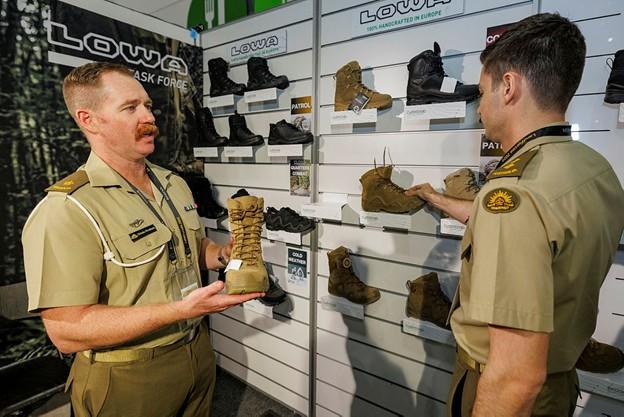
Australian Army soldiers inspect Lowa boots during Land Forces International Land Defence Exposition 2024 in Melbourne.
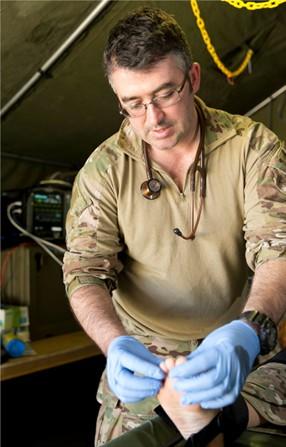
Australian Army soldier Corporal Luke Hayes, an advanced medical technician from 4th Combat Service Support Battalion, conducts a free from infection check during Exercise Diamond Strike at Shoalwater Bay training area, Queensland, in June 2015.
Free From Infection/Infestation (FFI) Inspections
Your JNCO will conduct periodic inspections of the troops to detect early signs of infection, infestation, or physical issues in personnel that could impair health or operational effectiveness. You should not wait for a directed FFI – you should be checking every time you take your boots off! Your health is critical to combat effectiveness and must be maintained. Don’t hide issues because you don’t want to let your mates down, you’ll let them down more if you are evacuated later for something you can prevent now!
Troop Hygiene Briefings Should Cover:
- Personal hygiene before, during, and after tasks
- Treating minor issues before starting missions
- Responsibility to report conditions that may affect others
- Use of protective gear and measures against disease-carrying insects
When to Perform an FFI:
- Before/after arduous military activities
- After exposure to environmental hazards (e.g. ticks, rough terrain)
- If a member shows signs of infection, infestation, or disability
Inspection Process:
- Ask for any personal complaints and check those directly first.
- Direct troops to undress to underwear, in stages, for a full-body check.
- Areas to Inspect:
- Hair: Lice, ticks
- Eyes: Infections
- Ears: Infections, insect bites, dirt rash
- Lips: Chafing
- Neck/Shoulders/Collar: Bites, sunburn, rash
- Armpits/Arms: Heat rash, bites, sunburn
- Torso/Crutch: Chafing, ticks, tinea, thrush
- Legs/Feet/Toes: Bites, leeches, blisters, ingrown nails, tinea, corns
- Refer to R1 (Role 1/Treatment Team) for medical care if necessary.







